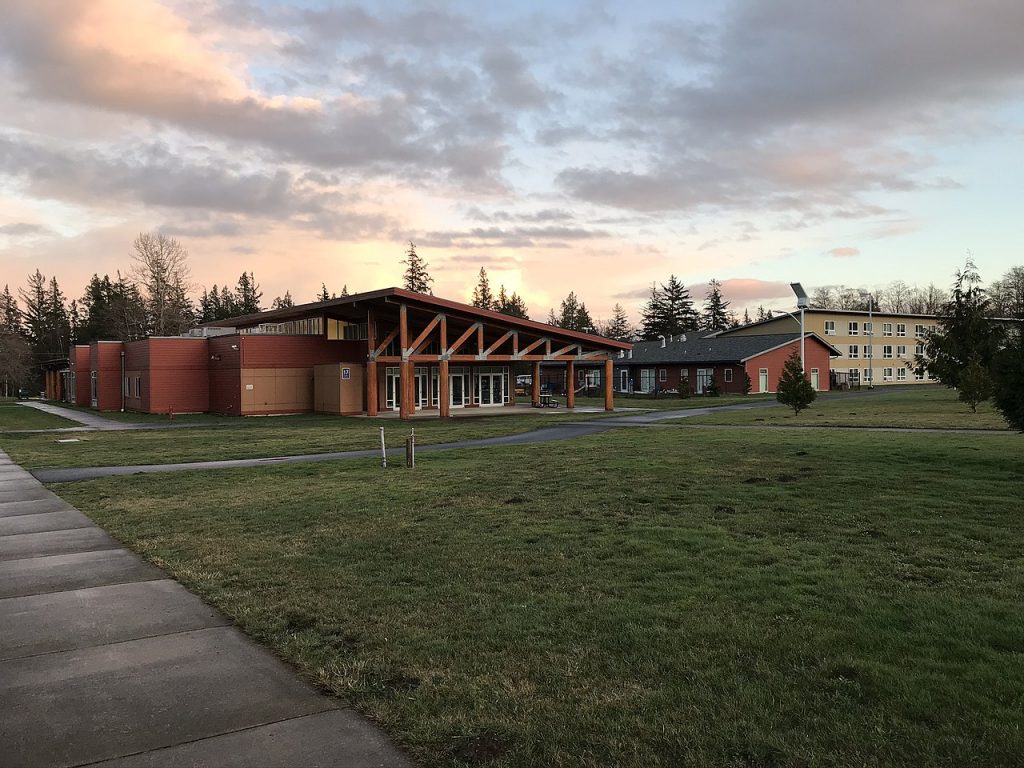Multiple colleges are now restricting travel. Northwest Indian College closed for a day of staff training. Conferences are canceled as concern grows. [Story updated March 13]
By Paul Boyer

As the number of confirmed coronavirus cases grows nationwide, tribal colleges are responding with increasingly aggressive efforts to prevent exposure to the virus within their campuses and communities. Many colleges are now prohibiting work-related travel. Some are extending spring break and preparing to move instruction online.
In response to growing concern, the American Indian Higher Education Consortium’s Spring Conference has also been canceled.
Northwest Indian College, located in Bellingham, WA, took what might be the strongest action to date when it announced a one-day cancellation of classes on March 11 in order to prepare staff and faculty for a possible closure of the campus, according to Dave Oreiro, the college’s vice president for administration and campus facilities.
Training included preparing faculty for a move to online instruction. While many mainstream colleges and universities—from Ohio State to Harvard—are closing campuses and switching to distance learning, Oreiro said tribal colleges have the added challenge of serving students who do not have their own computers or reliable internet access.
Additionally, Oreiro said the college has “canceled all travel for staff and students for the next two to four weeks and postponed major college and campus events, such as our annual Vine Deloria, Jr. Symposium and the annual Weavers Teaching Weavers Workshop.”
Northwest Indian College’s response reflects, in part, its proximity to the Seattle area, which has the greatest number of coronavirus cases in the nation and the largest number of deaths. This sense of urgency was reinforced Tuesday when the first coronavirus case in Whatcom County, WA was announced. The college’s main campus is located in Whatcom County.
Outside of Washington State, most tribal colleges are located in regions where infection rates remain low. According to the New York Times, there are currently no confirmed cases in Montana, where seven tribal colleges are located. North Dakota, which is home to five tribal colleges, reported its first case March 12. The number of confirmed cases in South Dakota, Minnesota, Michigan, Oklahoma, and Arizona was, until recently, in the low single digits, though numbers are climbing daily.
This sense of isolation initially led to relatively limited responses to the virus within tribal communities. “So far, it is business as usual for us,” said Jeremy Guinn, a faculty member at United Tribes Technical College in Bismarck, North Dakota, reported on March 10. “We are not discussing shutting down campus classes or anything of the sort. To this point, there has been no move to limit travel.”
Guinn and faculty at several other colleges said the primary response has been stepped-up efforts to educate the community about the virus and to encourage habits that limit its spread–what Steve Dupuis, a faculty member at Salish Kootenai College on the Flathead Reservation of Montana, described as “general ‘wash your hands’-type updates.”
However, the accelerated rate of infection nationwide is prompting more aggressive responses and, especially, policies that limit travel. In recent days, the Confederated Salish and Kootenai Tribe announced that it was prohibiting “all nonessential work-related travel for tribal employees.” Dupuis said this policy includes employees of the tribal college.
The tribal council’s directive also stated that tribal employees who travel on their own time to known hot spots–“which now includes most of the United States,” it said–will not be guaranteed leave. Additionally, “employees who do travel to known hot spots, upon their return, will be asked to remain out of the work place for 14 days. That time from work will not be covered by administrative leave.”
Staff and faculty at several other tribal colleges report that similar measures are also being developed within their communities:
- Nueta Hidatsa Sahnish College in New Town, ND announced on March 12 that it placing a moratorium on all work/school related travel until further notice.
- At College of Menominee Nation in Wisconsin, “all international and inter-state travel sponsored or coordinated through CMN is cancelled effective March 11, 2020.”
- Dine College on the Navajo Nation announced that it will extend spring break until March 23 and will use that time to transition some courses to online delivery. Multiple campus events are also canceled.
- On the Turtle Mountain Reservation of North Dakota, Carty Monette, retired president of Turtle Mountain Community College, shared information that the tribal government has “issued travel restrictions for any travel paid for by the tribal government and for travel by tribal employees that is on tribal business but may be paid for by another entity. They are advising band members to follow WHO guidelines.”
Restricted travel is resulting in a cascade of canceled academic meetings and conferences, including a March 10 decision to cancel the American Indian Higher Education Consortium’s Spring Conference. This much anticipated gathering of tribal college administrators, faculty, and students includes popular intercollegiate competitions, such as a science bowl and knowledge bowl, as well as events focusing on art, culture, and student government.
Originally scheduled for March 21-24 in Albuquerque, the announcement said the event will not take place “out of an abundance of caution and concern for tribal college students and their families, TCU faculty and staff, the residents of New Mexico, and most important, our tribal elders upon whom we depend.”
Even as the coronavirus disrupts academic life, a sense of uncertainty prevails. How worried should people be? What is the proper response? In an email, Jeremey Guinn mused that “North Dakotans do not easily move into panic mode, but it’s still a topic on everyone’s mind and this (attached) is the scene from Walmart’s toilet paper and Lysol aisle this morning”:

He continued: “That actually really surprised me considering most of us typically have a stash of necessities for the random blizzards that occur here.”
Still, he felt that locals remained officially skeptical. “My overall take is that most people think this is just like a normal flu and the media is blowing it out of proportion.” On the other hand, actions can speak louder than words and hoarding might reveal a deeper level of concern within the region.
To the west, Stacey Mortensen, director of institutional research and effectiveness at Nueta Hidatsa Sahnish College on the Fort Berthold Reservation also noted a mixed response.
“I suppose as one of the few states where the virus has not reached, we feel relatively safe at the moment. However, the panic is evidently hitting because I heard that toilet paper is going for about $40 for a big pack.”
Paul Boyer is editor of Native Science Report.
Native Science Report will continue to follow and update this story. Please email us if you have additional information about coronavirus-related policies within tribal colleges or Native communities: editor@nativesciencereport.org
